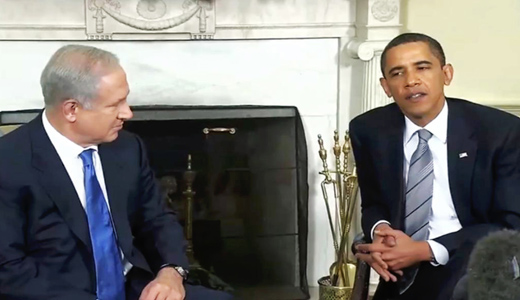
A top U.S. official called Israeli Prime Minister Benjamin Netanyahu “chickenshit” the other day. Republicans thought they could use this to boost their vote among “supporters of Israel.” But Jewish voters continued to vote heavily for Democrats on Tuesday. And, according to an Election Night poll, they overwhelmingly want the U.S. to actively push Israeli-Palestinian peace and a two-state solution, “even if it means exerting pressure on both the Israelis and Palestinians.”
“The thing about Bibi is, he’s a chickenshit,” a senior Obama administration official recently told Atlantic columnist Jeffrey Goldberg. “Bibi” is the Israeli prime minister’s nickname, commonly used. Netanyahu “won’t do anything to reach an accommodation with the Palestinians or with the Sunni Arab states,” the official said. “The only thing he’s interested in is protecting himself from political defeat [by catering to far-right members of his coalition]. He’s got no guts.”
According to Goldberg, “Obama administration officials express, in the words of one official, a ‘red-hot anger’ at Netanyahu for pursuing settlement policies on the West Bank, and building policies in Jerusalem, that they believe have fatally undermined Secretary of State John Kerry’s peace process.”
In addition, of course, Netanyahu and other top government figures in his right-wing coalition have repeatedly thumbed their noses at Obama.
Goldberg noted: “Netanyahu’s government has in recent days gone out of its way to a) let the world know that it will quicken the pace of apartment-building in disputed areas of East Jerusalem; and b) let everyone know of its contempt for the Obama administration and its understanding of the Middle East.”
U.S. Republicans jumped on the “chickenshit” comment, going so far as to claim it would hurt national security, and suggested that it would play a big role in the Nov. 4 elections.
It is common knowledge that Netanyahu and the Israeli right see U.S. Republicans as their better bet. In an article headlined “Netanyahu rooting for Republicans in U.S. midterm elections,” the Israeli newspaper Ha’aretz reported Nov. 3, “It’s no secret that Netanyahu and his aides are praying for control of the U.S. Senate to fall to the Republicans.”
Netanyahu’s ambassador to the U.S., Ron Dermer, “is investing most of his time lately meeting with Republican lawmakers,” the article noted, pointing to “Dermer’s exceptional attendance as guest of honor at a gathering of the Republican Jewish Coalition in March.”
“Casino mogul Sheldon Adelson, Netanyahu’s patron and the publisher of his mouthpiece, Israel Hayom, shelled out $100 million to try to defeat Obama,” the report added.
Also on Nov. 3, Amiel Ungar, a well-known spokesman for the right-wing Israeli settler movement, who himself lives in a West Bank settlement, wrote in Ha’aretz that Netanyahu would feel “satisfaction” at a Republican victory. Part of the pleasure, in this view, would be that, “as the Obama tide recedes,” U.S. peace and dialogue organizations like J Street, Open Hillel and Jewish Voice for Peace “will find themselves on the rocky shoals where they belong. This too is a cause for satisfaction.”
But Jewish voters cast their ballots for Democrats in Senate and House races by a 69 percent to 28 percent margin, according to the National Survey of Jewish Voters conducted on Election Night for J Street. Among the poll’s findings: “Most Jews believe construction of Israeli settlements in the West Bank should be suspended or restricted to certain areas, and large numbers of Jews think Netanyahu’s policies have hurt Israel’s relations with the United States.” Further, “support for US engagement, even if it means public disagreements (72 percent) or public pressure (74 percent) on both Israelis and Palestinians, is remarkably consistent over the past 6 years.”
Those results are confirmed by what congressional staffers told a couple of very pro-Israeli-government lobbyists. According to a report by JTA, the Jewish American news service, “Among the statements the dozen congressional staffers agreed on: ‘Israel attacked Gaza in a wild overreaction.’ ‘It’s Groundhog Day every 18 months, perennial conflict, doesn’t seem like anyone wants peace anymore.’ [The Israeli government is] ‘not peace loving.'” The lobbyists complain: “it appears that the negativity and lack of support among young people is tunneling its way into congressional offices, even while the congressmen and senators remain steadfast on the surface.”
The New York Jewish Week – which Goldberg describes as “the flagship American Jewish newspaper, center to center-right in orientation, with many thousands of Orthodox Jews among its readers and an ardently pro-Israel editorial line” – took note of the fact that “Israeli Prime Minister Benjamin Netanyahu announced plans to build more than 1,000 new units in Jerusalem neighborhoods beyond the Green Line, fully aware of the negative response it would receive in America and in the international community.”
Responding to Netanyahu’s claim that criticism of the move is “detached from reality,” the Jewish Week editorialized: “But it’s fair to ask just who is more detached from reality these days, the president of the U.S. and leader of the free world, or the leader of a small country almost totally dependent on American support? (It’s not so much the $3 billion a year in U.S. aid that counts as much as its support at the UN and in countless other ways that would be felt should the relationship continue to erode.)”
“The prime minister, sensing calls for a new election, is bolstering his political right and keeping his right-leaning coalition together …” the paper said. “But it’s a dangerous and unnecessary provocation.”
Criticism of Israeli policies, like talk of normalizing relations with Cuba, has long been considered a third rail in American politics – in other words, don’t go there. The reason has been fear by politicians of a backlash from influential reactionary pro-Israel, or anti-Castro, constituencies and lobbyists.
But, in both cases, that may be changing. These trends are important to take note of. And they could help move President Obama to take positive action on these issues in his remaining two years in office.
Photo: Rocky road: Israeli Prime Minister Benjamin Netanyahu meets with President Obama in the Oval Office, May 18, 2009. Wikipedia

MOST POPULAR TODAY

High Court essentially bans demonstrations, freedom of assembly in Deep South

U.S. imperialism’s ‘ironclad’ support for Israel increases fascist danger at home

UN warns that Israel is still blocking humanitarian aid to Gaza

Resource wars rage in eastern Congo, but U.S. capitalism only sees investment opportunity







Comments